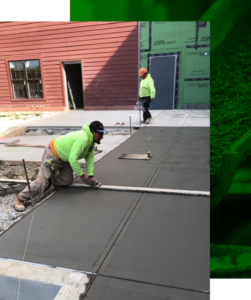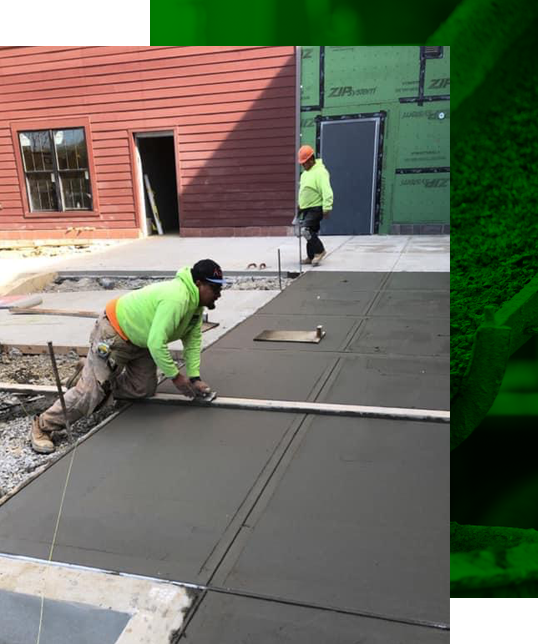Concrete Contractors Dallas TX are the workers that create, place, finish, and install specified mass, pavement, flatwork, and other concrete work. They should be licensed and insured.
They know how to complete projects on time and within budget. They will also be openly communicative with you throughout the entire process.
The popular saying “walk a mile in their shoes” absolutely rings true for concrete contractors.
Concrete contractors are specialized people who are trained to handle concrete in all its stages, from the initial mix to the hard-finished foundation. They can use their knowledge and skills to create intricate plans and designs for building projects. They can also finish the job quickly since they have a lot of experience in the field.
In addition to their knowledge and expertise, good concrete contractors are well-versed in the industry’s current standards and regulations. They should be able to follow the strictest safety rules in order to protect themselves and others on the site. They should also be able to work well with other construction workers and contractors, as they often work on large projects.
When choosing a concrete contractor, you should also look at their demeanor. You want to choose a person who has a friendly personality and is willing to talk with you about your project. A good contractor will take the time to answer any questions that you may have and will return your calls in a timely manner. On the other hand, if a person is hesitant to speak with you or does not call back in a reasonable amount of time, this could be a red flag.
If you’re looking for a concrete contractor, you should also make sure that they are licensed, bonded, and insured. This will ensure that they are properly trained and qualified to do the job. It will also give you peace of mind that they’ll be able to complete the project safely and on schedule.
Another thing to keep in mind is the type of work that the contractor does. Some contractors specialize in residential work, while others focus on commercial projects. This is important because the techniques and tools used in these two types of projects are different. For example, residential concrete work usually involves pouring walkways and patios. However, commercial concrete work is much more complicated and requires a higher level of skill.
Lastly, a good concrete contractor will be able to communicate clearly with their clients and other contractors. They will be able to explain the project in an easy-to-understand way and provide updates on their progress. This is particularly important for large projects, such as commercial construction, where it may be difficult to get in touch with the contractors.
Equipment
Concrete contractors are in charge of building and repairing concrete structures for commercial projects, so they need to have a variety of equipment on hand. These tools and supplies are used to help prepare the site, lay the concrete, and complete the project on schedule.
One of the most important pieces of equipment is a specialized formwork. Contractors use this equipment to create the mold for the concrete while it is being poured. This helps to keep the concrete in shape until it has fully hardened. The forms can be made from plastic, metal, or wood.
Another piece of equipment is a screed machine. Contractors use these machines to smooth out the surface of concrete while it is still wet. They can be simple contraptions like a truss screed, which is just a blade mounted on a truss frame that contractors manually pull to level the concrete, or they can be motor-powered rollers or laser-scanning machines for larger surfaces.
Concrete contractors also need to have a number of power tools on hand. A power trowel is an essential tool that can be used to finish a concrete job. These tools are powered by a motor and have different types of blades for specific projects. They are also available with a variety of attachments to meet the needs of each project.
Depending on the structure, contractors may need to drill holes into the concrete to reinforce it with rebar. This is called doweling, and it is a common method for connecting new concrete to existing structures such as a foundation or sidewalk. Often, the engineer will specify the number of dowels needed and the depth of each hole.
Shovels are another indispensable piece of concrete construction equipment for concrete contractors. They are used to fill buckets and wheelbarrows, mix concrete, and level grades. A good pair of work gloves is also essential to protect the hands from concrete slurry and other debris. A water pump is useful for removing excess water from a concrete surface, and curing compound can be applied to the concrete to reduce cracks and slow its set time.
Insurance
Concrete contractors are responsible for building the foundations of our homes, businesses, and other important structures. Their work is critical to our everyday lives, but it comes with a certain degree of risk. That’s why many concrete contractors take steps to reduce the risks associated with their business by purchasing insurance coverage. The right insurance policy can protect a concrete contractor against substantial legal costs in the event of a claim or lawsuit.
General liability insurance is a standard part of any concrete contractor’s insurance program. This type of insurance offers protection in the event that your employees damage property that doesn’t belong to your business or if a third party is injured by your equipment. It’s also often required by project owners or licensing agencies.
Commercial auto liability insurance is another crucial component of a concrete contractor’s insurance program. This type of insurance offers protection in the event that an employee of your business damages or injures someone while driving a company vehicle. If your concrete contractor business has a fleet of vehicles, including cement mixer trucks, it’s recommended that you purchase high levels of auto insurance.
Workers’ compensation insurance is another must-have for concrete contractors. This type of insurance covers medical expenses and lost wages for workers who are injured on the job. It’s also often required by law in most states. You can find workers’ compensation policies that include extra benefits like rip and tear coverage, which protects your tools and equipment against the cost of repairing or replacing them after an accident.
Errors and omissions insurance, or professional liability insurance, is another important coverage for concrete contractors. This type of insurance can pay for damages and legal fees if your clients sue over errors or mistakes that result in financial loss.
Other types of insurance that concrete contractors should consider getting include business interruption insurance, which pays for the financial losses incurred due to an inability to work during a covered peril such as a fire or natural disaster. Finally, a concrete contractor should consider purchasing commercial property insurance to protect their office, warehouse, inventory, and other physical assets. This type of insurance typically offers broad property and equipment coverage, as well as business personal property coverage.
License
Concrete contractors have to be licensed in order to work with concrete. The licensing process varies by state. Generally, you need to provide proof of your ability to perform the type of work that you are applying for a license to do. This includes showing that you have the skills, knowledge, and experience needed for concrete construction. You also need to pass an exam and meet other requirements, such as a bond.
Getting a license is not easy for a concrete contractor. It requires a lot of hard work and dedication. Concrete contractors must be able to read blueprints, follow oral and written instructions, and make simple calculations. They must also have the physical endurance to stand for long periods of time on their feet while working. Additionally, it is important for concrete contractors to know how to use all of the tools and equipment that they are required to have on hand.
Commercial concrete contractors are individuals or companies that specialize in providing concrete construction services for commercial properties. They can be hired to pour new concrete foundations, repair and maintain existing concrete structures, or install decorative concrete features. They have the expertise and equipment necessary to complete large-scale projects such as those found in shopping malls, office buildings, and warehouses.
If you want to become a commercial concrete contractor, it is important to decide where you would like to focus your work. There are many different opportunities available in this field, so it is important to choose one that is a good fit for your skill set and preferences. You may also want to consider attending a trade school or apprenticeship, which can be an excellent way to learn the skills of the job.
It is also a good idea to get liability, workers’ compensation, and company auto insurance. This will protect you in the event that someone is injured while working on your project. In addition, you should always have a supply of concrete on hand, so be sure to get in touch with a supplier who can deliver the concrete you need on a timely basis.
